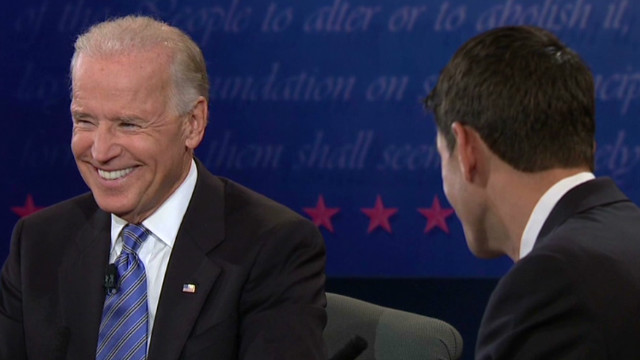
Best zingers from VP debate
- The debate wasn't only a clash of ideas; it was a contrast of styles, say contributors
- Tim Stanley: Candidates were in different worlds, pugnacious Biden vs. wonkish Ryan
- Paul Begala: Calling Romney-Ryan's plans "malarkey" was a home run for Democrats
- Julian Zelizer: Both sides will be able to boast about their candidates' performance
(CNN) -- Vice President Joe Biden met his challenger, Rep. Paul Ryan, Thursday night in Danville, Kentucky, for the vice presidential debate. CNN contributors and analysts offered these assessments of the evening:
Timothy Stanley: Debate was sports bar vs. seminar
This was a strange debate, even an ugly one. The two men looked like they were taking part in separate discussions. Ryan was speaking in the economics seminar at some obscure think tank. Biden was shouting answers in the middle of a loud sports bar.

The tone was so uneven that the candidates seemed to find each other's presence a nuisance -- Biden laughed his way through Ryan's answers and Ryan was often visibly irritated. The most surreal moment was when Biden picked a fight with the moderator, Martha Raddatz, about the Afghanistan War. We've never seen him this pugnacious.
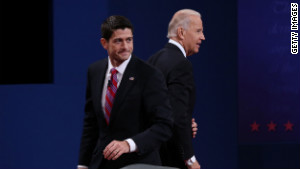
 Who won the vice presidential debate?
Who won the vice presidential debate? 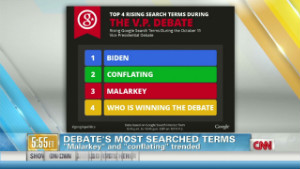
 'Malarkey,' 'shirtless' trend in debate
'Malarkey,' 'shirtless' trend in debate 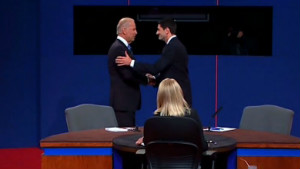
 Amusing moments during VP debate
Amusing moments during VP debate 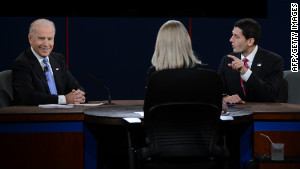
 Biden, Ryan hold lively VP debate
Biden, Ryan hold lively VP debate Overall, it was a draw. Liberals will probably appreciate that Biden did what Obama failed to do last week: He took the debate to the Republicans and called out their "malarkey." But moderate voters might take offense at his combative tone, which often bordered on rude. By contrast, Ryan's softer, more wonkish style might strike floating voters as weak. But he could also score among those looking for calm and reason rather than heated rhetoric.
Biden excelled when attacking Ryan on Romney's flip-flops and failure to commit to specific spending cuts. Ryan excelled when talking about his beloved Medicare and tax plans. Both men displayed thoughtfulness and humanity in the question of abortion, which pitted different traditions of Catholicism against one another.
Ryan said his faith and his public policy were inseparable; Biden refused to compel others to adhere to Catholic doctrine. Again, how the voter reacts to those answers will depend on their prejudices. This debate wasn't about persuasion. It was about drawing contrasts and playing to the cameras. As a result, it probably wasn't the game changer that either side was looking for.
Timothy Stanley is a historian at Oxford University and blogs for Britain's The Daily Telegraph. He is the author of "The Crusader: The Life and Times of Pat Buchanan."
Politics: Five things we learned from the VP debate
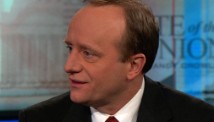
Paul Begala: Biden's "malarkey" line sums it up
I sometimes think the definition of a Democrat is someone who is afraid to take his own side in a fight.
Malarkey.
With that one word, spoken in the opening minutes of the vice presidential debate, Joe Biden signaled he was fighting back. Biden gave the Democrats the debate they needed. He grabbed Paul Ryan by the scruff of his neck and gave him a thorough thrashing.
Biden pounced on Ryan for seeking to cut funding for embassy security, even as he played politics with the terror attack on our consulate in Benghazi. The Malarkey Moment surprised Ryan and energized Biden. Perhaps smelling blood in the water, Biden kept Ryan on his heels for the rest of the evening.
Ryan gulped water as Biden spoke, and Biden smiled (sometimes you could tell it was forced) as Ryan talked. And for all the times they called each other "my friend" and said, "with all due respect," both candidates had a tone of exasperation at times.
Biden hammered Ryan and Romney for sneering at a giant percentage of Americans. Ryan has called as many as 40% of our fellow citizens "takers." Yet he more than once spoke of his family's dependence on Social Security and Medicare. Biden wouldn't let him get away with it. Finally, it got to Ryan, who snarled, "I know you're under a lot of duress." Whoa, sonny-boy, watch the snark. You're getting your butt kicked, and it shows.
The Obama campaign released a photo of President Obama watching the debate. Good. The president was criticized for being too passive in the first debate. Some may criticize Biden for being too aggressive in this one. So be it. But I loved his performance, and I bet the president did as well.
Paul Begala, a Democratic strategist and CNN political contributor, is senior adviser to Priorities USA Action, the biggest super PAC favoring President Barack Obama's re-election. Begala was a political consultant for Bill Clinton's presidential campaign in 1992 and was counselor to Clinton in the White House.

Ana Navarro: What Obama could learn from Biden
I'm a Republican pundit. I'm supposed to write that Paul Ryan crushed Joe Biden and turned him into dust in tonight's debate. But I've accidentally consumed some truth serum. I saw this as draw. Both Biden and Ryan were prepared, well practiced and brought their A game to the table. The campaign spinners are going to make the case their respective candidates won. In my book, they both scored victories.
Biden won because unlike President Obama in the first debate, Biden did not clearly, unequivocally lose. He stopped the bleeding for his camp. Had Biden followed in Obama's example and given a lackluster performance, it would have been the fatal blow. Instead, Obama lives to fight another day.
Ryan also came out victorious. He shared the stage with a sitting vice president and one of he most veteran politicians in America and held his own. Ryan went toe to toe with the vice president, even when discussing foreign policy, Biden's strength. Despite his youth, Ryan looked vice presidential. He debated a man who could easily be his father, but they sat there as equals and on even footing.
Neither of them blinked or ceded an inch. Both of them came armed with facts and figures but also gave us a view into their personal side. This was a good debate for Joe Biden and Paul Ryan, and also for the American people. We got to see the two sides passionately advocate distinct positions. There is no muddled gray area here.
Folks, buckle up! We have a tight race in our hands. The vice presidential debate has made the next presidential debate that much more crucial. If President Obama hopes to reverse the tide, he could stand to learn a few lessons from his vice president. For starters, show up not only in body, but also in soul. Engage your opponent, better yet, look at him. Challenge the statements you think are inaccurate. Don't leave opportunities on the table. Don't just stand at the plate; swing at the balls pitched at you.
Joe Biden was being compared to President Obama in the first debate. He vastly outperformed him. Paul Ryan was being compared to Joe Biden, and he stood his ground. The ball now goes back to Romney and Obama's court. A few months ago, some Democrats were fretting about whether it would be better to replace Biden on the ticket. If President Obama doesn't come out swinging and deliver an energetic performance in the next debate, Democrats might find themselves wondering if the wrong guy isn't on the top of the ticket.
Ana Navarro, a Republican strategist and commentator, served as national Hispanic campaign chairwoman for John McCain in 2008 and national Hispanic co-chair for Jon Huntsman's 2012 campaign. Follow her on Twitter @ananavarro.
Feisty VP debate sets up Obama-Romney rematch

Bob Greene: The words that echoed loudest
It wasn't a moment that will make the headlines.
But of all the words spoken Thursday evening, they were the ones that may have had people of every political persuasion, all across the country, nodding their heads in quiet agreement.
The words came about eight minutes before the conclusion of the vice-presidential debate. They were spoken not by either of the candidates, but by the moderator, Martha Raddatz.
She prefaced her thoughts by saying she knew that both men had great respect for the people who serve in the military. And then she said:
"I recently spoke to a highly decorated soldier who said that this presidential campaign has left him dismayed. He told me, quote, 'The ads are so negative, and they are all tearing down each other rather than building up the country.' What would you say to that American hero about this campaign, and at the end of the day, are you ever embarrassed by the tone?"
The answers given by Joe Biden and Paul Ryan -- serious in tenor -- were not as stirring as the question itself, because unless you are a professional political operative whose job it is to attack the other side, you recognize the wisdom in that soldier's words. Raddatz did not mention what the soldier's political allegiance was, and it would have been beside the point. What mattered is that he is an American, and he believes that much of the tone of the campaign has been beneath the dignity of what Americans should expect.
Biden repeatedly referred to Ryan as "my friend"; Ryan, at the end of the proceedings, thanked Biden -- he referred to him as "Joe" -- and said it had been an honor to debate him.
People tend to accord each other that kind of courtesy when they have to look each other in the eye. Friday morning, though, the ad wars will resume, like bombing raids conducted from two miles in the air. The truth of that is undebatable.
Bob Greene is a best-selling author whose 25 books include "Late Edition: A Love Story," "Duty: A Father, His Son, and the Man Who Won the War," and "Once Upon a Town: The Miracle of the North Platte Canteen."
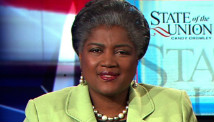
Donna Brazile: Who says VP debates don't matter?
Joe Biden proved tonight that vice presidential debates can -- and should - matter. And Martha Raddatz proved that moderators can -- and should -- moderate. Paul Ryan showed that talking points, an engaging personality and a few personal anecdotes can't mask bad policy, misinformation and ignorance.
Paul Ryan attempted to dominate the conversation -- a bullying tactic he took from Romney's playbook and that clearly irritated Biden. He rattled off misleading information, half-truths and cooked-up numbers. He made unsubstantiated claims about President Obama, the effects of his policies, both here and abroad, and ignored the context of the last four years: the "Great Recession" and Republican congressional obstructionism. Biden successfully challenged them all.
Raddatz pressed both candidates for specifics and would not be bulldozed. She kept the debate moving, didn't let it deteriorate (too much), and asked hard questions. At various points, both candidates were uncomfortable; both Biden and Ryan had "I don't want to answer that" moments. That's a sign the moderator was doing her job. For the most part, she let them debate, but acted as guide and, well, moderator. It's a tough line moderators have to walk, but Martha Raddatz did it as well as anybody.
Joe Biden came prepared to argue, to debate and to be Joe. He didn't allow the "less than candid" Republican claims to go unchallenged. When Ryan brought up "values," Biden brought up "responsibility," and the disdain Romney and Ryan have for 47% (or 30%) of the American people. He even countered Ryan's reference to his "gaffes," replying, "I always say what I mean."
Ryan was salesman smooth and knew his talking points. Biden was passionate and "fired up." Ryan talked; Biden shared experience. Both men could argue, but only Biden was intense -- because he spoke -- and frowned and gestured and smiled - from his heart as well as his mind.
A young woman, in her early twenties, wrote me after the debate that Joe Biden inspired her with his fervor and honesty to register and to vote.
Yes, this debate mattered. A lot.
Donna Brazile, a CNN contributor and a Democratic strategist, is vice chairwoman for voter registration and participation at the Democratic National Committee. She is a nationally syndicated columnist, an adjunct professor at Georgetown University and author of "Cooking With Grease." She was manager for the Gore-Lieberman presidential campaign in 2000.
First two debates couldn't be more different

Margaret Hoover: Ryan ahead on style and substance
Bottom line -- this debate will amount to a draw.
Biden, who needed to stop the hemorrhaging of momentum from the Obama-Biden campaign, performed strongly, but was overly aggressive. If he was downright rude, according to many in the Twitterverse, he got a pass from the president's supporters, who can only hope they see this offense from the commander-in-chief next week. Biden tried to dominate the debate, lost on style and stumbled on substance.
Ryan seemed less confident on foreign policy at the beginning, but recovered on Afghanistan, where he's visited twice and had a personal anecdote to illustrate his time in Helmand Province. I wish he'd called Biden out when he accused Ryan of voting to "to put two wars on a credit card." Biden, too, voted for both wars. The high water mark of the performance was Ryan's fancy footwork early that took 47%-gate off the table in quipping, "I think the vice president very well knows that sometimes the words don't come out of your mouth the right way." Even Biden had to chuckle.
This split screen captured the contrast in visions of the two vice presidential candidates on fiscal policy. Appropriately on the left, older Joe Biden, defending big government and modern liberalism's spending and fiscal denial with a grinning fresh face offering new ideas for fiscal reform and longevity from the right.
Ryan was classy to thank the vice president for the debate, even after having been smirked at for the previous 90 minutes. But Biden's graciousness to Ryan's mother once the microphones were cut portrayed his interpersonal warmth that plays so well on the campaign trail.
I think Ryan had the advantage on substance and style. In a national race where both guys are second runner-up, this is effectively a draw for how it plays into the larger campaign narratives.
Margaret Hoover is the author of "American Individualism: How a New Generation of Conservatives Can Save the Republican Party."

William Howell: Ryan's challenge was bigger, and he met it
No great surprise, Joe Biden delivered tonight. On the heels of his boss' withering performance last week, the vice president demonstrated his deep knowledge of domestic and foreign policy issues, fluidly maneuvering between minutiae about tax policy and the draw-down in Afghanistan on the one hand and meta-arguments about the stakes involved in this election on the other. He also scored his share of style points.
Though all that laughing through those big pearly whites proved a bit unnerving at times, Biden exhibited his relish for a good debate and his conviction in essential liberal principles. The Democratic base is surely pleased.
It was Paul Ryan, though, who faced the bigger challenge. Ryan had to prove his commitment to ideas and principles that are not entirely of his choosing. During the primaries, when Romney was brandishing his conservative credentials, this task would have been easily met. But going into this debate, it was not clear that the darling among the conservative right would be able to square his views with those of the more moderate incarnation of the former governor of deep-blue Massachusetts. But well he did.
Disciplined, substantive and on point, Ryan effectively thwarted efforts by Biden to drive a wedge between the congressman's former voting record and the policy positions of the Romney-Ryan ticket. He performed as well as his party could possibly have hoped.
This debate is not likely to move the polls much at all. But that is not to say that it is entirely inconsequential. For at least the coming week, Democrats can now talk about something other than their president's detachment. And Republicans generally, but Romney in particular, can rest assured that the GOP presidential ticket is in order as they settle on a consistent message to push through Election Day.
William Howell is the Sydney Stein professor in American politics at the University of Chicago.
Who won the VP debate? Martha Raddatz

Maria Cardona: Pressure is on the next two debates
This was one of the best vice presidential debates I've seen. The pressure was on Vice President Joe Biden to deliver a great performance -- and deliver he did.
Biden was assertive and aggressive, and he didn't let any untruth or distortion coming out of Paul Ryan's mouth slide.
From Medicare to taxes to Iran to Afghanistan to the 47% to abortion, Biden did not miss an opportunity and was as clear as he could have been on how President Obama would be on the side of middle-class families, seniors, women and those most vulnerable in our society. He was factual and specific. His years of experience in the Senate showed as he commanded the stage with his expertise.
Rep. Paul Ryan held his own, didn't make any mistakes and was prepared. But he was outwitted by Biden and challenged by the moderator Martha Raddatz when he was being vague.
Ryan's weakest moments came when he was pressed for specifics. He seemed demure on the issue of what loopholes he would close or how he and Mitt Romney would pay for the tax cuts and defense spending increases they are proposing. Raddatz pushed him on these points, and he did not have a satisfactory answer. In some instances, whether it was on economic issues or Iran, Ryan was not able to say what he and Romney would do differently.
Biden came across as more authentic, much more passionate and as a guy who is a real champion of the middle class. Moreover, Biden was able to stop the bleeding, get Democrats excited about the next two debates and inject some much needed energy and optimism coming out of the doldrums from last week's presidential debate.
Did the debate change any minds? Probably not. It seems Republicans are happy with Ryan's performance just as Democrats are happy with Biden's.
What this means is that the remaining two presidential debates take on even more importance for how this race will continue to play out. Stay tuned.
Maria Cardona is a Democratic strategist, a principal at the Dewey Square Group, a former senior adviser to Hillary Clinton and former communications director for the Democratic National Committee.
Read a transcript of the debate

John Avlon: Biden overwhelms Ryan
I underestimated Joe Biden.
Before the vice presidential debate, I'd thought that Paul Ryan would have the upper hand -- a young, smart policy wonk and great communicator paired off against an out-of-practice, aging politico with a recurring case of foot-in-mouth disease.
I was wrong.
Joe Biden had clearly studied Barack Obama's failures in the first presidential debate and decided to do the exact opposite -- intensely engaged, smiling and pushing back aggressively at the slightest hint of misstatement or exaggeration.
Paul Ryan was bobbing on the sea of Biden, keeping his head above water much of the time but occasionally overwhelmed by the combined force of personality and facts. He looked like what he was -- an earnest, intelligent, over-coached, comparatively inexperienced chairman of the Budget Committee.
Moderator Martha Raddatz had perhaps the best debate, especially compared to the unfocused Jim Lehrer; she actually asked pointed questions and follow-ups.
And it was there that the campaign spin had to surrender to stats and facts. Ryan is a budget expert, but he either didn't want to acknowledge or didn't know his own campaign's proposal to increase military spending to 4% of GDP, adding $2 trillion in federal spending over 10 years and blowing a hole in their deficit reduction rhetoric. Likewise, questions about what specifically a Romney-Ryan administration would do differently about Syria, Iran or Afghanistan went essentially unanswered despite the flurry of words.
Joe Biden made his share of unforced errors -- interrupting Ryan far too much and getting so overheated at one point that he turned his frustration against the moderator in an awkward spate of finger-pointing.
Ryan also shined in his discussion of deficits and debts, contrasting the president's speeches with score-able policy. His closing statement was disarming and compelling.
The best moment in terms of style and substance was Raddatz's question about abortion and the candidates' shared Catholic faith. Both men gave serious, thoughtful answers on this most difficult of subjects -- but Ryan's anti-abortion agenda contrasted to Biden's belief that he could not impose his personal religious views on an individual woman's decision. It was an eloquent defense of the separation of church and state -- a core concept we have heard too little about in recent years.
This debate might not get as many viewers as the 70 million Americans who tuned in to the Biden-Palin debate in 2008 -- but it was far more substantive, energetic and serious. It was a great debate -- simultaneously civil and contentious -- the kind we need more of in the United States.
Biden's strong performance gave the Democrats a much needed shot in the arm, a compelling defense of their values and beliefs that will buoy their sagging morale and change the narrative going into the second presidential debate on Tuesday.
It might not have changed many undecided minds, but it changed the momentum -- and that's a win in our democracy circa 2012.
John Avlon is a senior political columnist for Newsweek and The Daily Beast. He is co-editor of the book "Deadline Artists: America's Greatest Newspaper Columns." He is a regular contributor to CNN's "Erin Burnett OutFront."

Julian Zelizer: Something for both sides
Vice President Joe Biden and Rep. Paul Ryan engaged in a vigorous debate, with a moderator who kept pushing the discussion along.
Both sides will find something in the debate that they can boast about. Ryan demonstrated he could debate policy areas where he is not as experienced, particularly foreign policy, and he handled himself well before the television cameras. He remained calm under fire. Ryan was also able to tell a few personal stories that he used to try to humanize the image of his running mate.
For Democrats, who needed a much bigger boost, Biden came through in that he was much more aggressive than Obama was in last week's debate, hammering away at Republican economic policies, warning voters about his opponent's Medicare plan and defending the administration's actions overseas. Biden consistently raised questions about whether Ryan and the Republicans are even telling the truth when they speak. During the last segment of the debate, Biden seemed to be at his strongest, a Democrat who was tough on national security and someone who was on firmer ground than his opponent with regard to understanding these challenges. Biden said what many Democrats wanted President Obama to say against Romney, showing the enthusiasm and the fire that was absent last week.
There are some viewers who might have been turned off by Biden's tendency to laugh and shake his head in dismissive fashion as Ryan was speaking. The danger for Democrats is that some swing voters read this as arrogance and partisanship rather than a sign of Biden's comfort before the cameras.
Like other vice presidential debates, this one probably won't have much of an impact on the electorate, though it will help curb some of the media discussion about Obama's poor first performance and generate some excitement among Democrats who were left deflated after Denver. Finally, both candidates handled themselves well enough that it probably won't have any major effect on their fortunes if they choose to run for the presidency in 2016.
Julian Zelizer is a professor of history and public affairs at Princeton University. He is the author of "Jimmy Carter" and of the new book "Governing America."
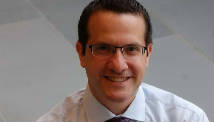
Aaron Carroll: Debate shed little light on Medicare, Medicaid
No one will confuse this debate and the last one. Both participants came prepared to fight. There are many who will say that Vice President Biden was too forceful, or was disrespectful, but for supporters of the president who wanted to see a more energetic response to the Republican campaign, Biden's performance was likely a balm.
The polls will tell us in the next few days, but if Biden's actions tonight inspire the base as I think they likely will, then the president will see some benefit.
Of course, my main interest is health policy, and in that respect, tonight was a bit disappointing. The entire discussion centered on Medicare. For all the bluster between the two campaigns, the differences between them on that program for the next decade are small.
For all the talk about the financial risk Medicare holds, neither wants to cut it severely soon. On Medicaid, however, the differences are stark; that program didn't come up at all.
I also was appalled that raising the Medicare age of eligibility was tossed off as an obvious thing to do. That's a terrible idea.
Dr. Aaron E. Carroll is an associate professor of pediatrics at the Indiana University School of Medicine and the director of the university's Center for Health Policy and Professionalism Research. He blogs about health policy at The Incidental Economist and tweets at @aaronecarroll.
Follow @CNNOpinion on Twitter
Join us at Facebook/CNNOpinion
The opinions expressed in thisary are solely those of the authors.
No comments:
Post a Comment